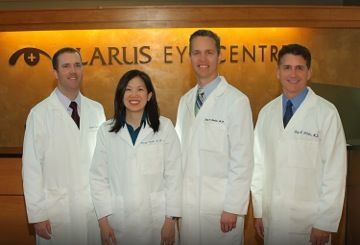Submitted by Dr. Penny Reck for Clarus Eye Center
If you have age-related macular degeneration (AMD), questions regarding vitamin supplements and nutrition may frequently pop in your head. As a vitreoretinal specialist and surgeon, I frequently hear this from patients with AMD. Below I will address the vitamin supplementation recommended for AMD patients, along with good dietary choices.
AMD and Vitamins:
“Doc, should I be taking special eye vitamins? If so, what kind?” If you do not have AMD, there is not a study that recommends a special formulation developed specifically for the eye. If you have AMD, then the answer is, “Maybe, it depends.” What does it depend on? A few factors, such as:
- Your stage of AMD
- AMD is classified as nonexudative (“dry”) or exudative (“wet”)
- There are 3 stages in dry AMD: early, intermediate, advanced
- Wet AMD is classified as advanced
- Whether or not you have the advanced stage of AMD in one eye
- Your smoking status
If you have intermediate AMD in either eye or have any form of advanced AMD in one of your eyes, then the vitamin supplementation is recommended according to the Age-Related Eye Disease Studies (AREDS or AREDS2) that were performed by the National Eye Institute (NEI) to slow progression of disease. However, if you are a smoker, the AREDS2 formulation is recommended due to the removal of supplemental beta-carotene in the newer AREDS2 formula. Prior studies have demonstrated an increased risk of lung cancer in smokers associated with taking supplemental high doses of beta-carotene.
More detailed information regarding AREDS and AREDS2 can be found at the NEI’s website.
AMD and Nutrition
What should you be eating? Studies performed prior to the AREDS studies showed that eating foods rich in the carotenoids, lutein and zeaxanthin, can also help decrease your risk of AMD. Carotenoids are organic pigments found in nature that provide a variety of functions. In humans they act as antioxidants and have a protective function against oxidative processes that can injure the cells in the retina, such as the degenerative process that occurs in AMD.
Green leafy vegetables (such as spinach, kale, collard greens) are high in lutein, but several foods of other colors (such as corn, oranges, orange peppers, squash, red grapes) also carry high percentages of carotenoids. Therefore, it is important to try to eat a variety of different colors of produce in your diet.
Additional Info and Resources
Here are some additional informative resources:
American Macular Degeneration Foundation
Saving Vision (online resource provided by the American Society of Retinal Specialists)
Get Eye Smart.org (eye health information from the American Academy of Ophthalmologists)
Eye Wiki (online “eye encyclopedia” written by eye physicians and surgeons)



















































